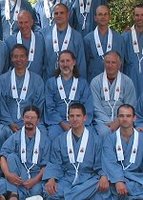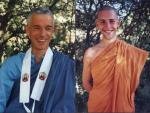My response is that this is a difficult question to answer. For a start, would we know an Awakened person if we met them? We might if we spent some time observing them. But in a chance or glancing encounter we may fail to recognise their special qualities. There are ample stories of this nature in the Pali Canon.
Then what would it mean for someone to say that someone they know is Awakened? Surely we would have to have an inordinate amount of trust in our informant for their words to make much difference in our lives. What would it mean if we ourselves said someone was Awakened?
What it comes down to, and this came out in our conversation, is that we want guarantees that the Dharma is going to make our lives better. Having someone who totally exemplifies the Dharma would make believing a lot easier. Where is the Buddhist messiah to save us from ourselves?
But actually the Dharma never really operated this way. The Buddha of the Pali Canon doesn't go around saying: take this on faith. The Dharma, he says, is ehipassiko. Ehipassiko literally means 'come and see'. And in a way this is better than having a messiah! What we do is we start to practice a little mindfulness and we evaluate the results. Most people, however difficult they find it, report that being a bit more mindful makes them a little happier, a little more alert, a little less stressed. We are then ready to take the next step whatever that might be for us.
We may need a teacher who can show us the next step, although often after some experience of practising, it is obvious to us what our next step should be. Often what we want is a teacher who has all the answers, who can advise us on every crisis, who can guide our every step. We want a messiah. We are not ready, willing, or able, to take personal responsibility for our consciousness. But having been given a few basic tools, most of us are quite capable of making progress in the Dharma.
The original model of practice in Buddhism was often very simple. Someone would meet the Buddha or one of his disciples, they would be given a Dharma talk in the course of which they became firmly convinced of the truth of the Buddhadharma. They would then be given a method of meditation, or a subject for reflection, and be sent off to practice. Alone in the jungle they would use this single tool to penetrate the nature of reality, Awaken to the truth of it, and then return to report on their findings. What we get these days, with some exceptions, is elaborate systems of practice with a bewildering variety of approaches, 1000's of books, and 1000's of Dharma talks, all giving us much to think about. Rather than the simple certainty of a straight forward approach, we get a plethora of ideas, most of which we cannot hope to put into practice.
There's really no point at all in reading about the highest yoga tantras if we cannot sustain basic mindfulness. Very few people would read a book on advanced physics before having thoroughly studied the foundations and expect to get anything out of it. There is a case for reading inspirational literature. The lives of Buddhist saints can be very inspiring. But lets face it, most of us need to be looking much closer to home.
The good news is that if we take this incremental approach to practice then we do make progress. And our confidence in the Dharma gradually increases, not on the basis of our guru's charisma or through blind faith, but from actually experiencing the results of practice first hand. My own confidence in the Dharma is not dependent on my teachers, nor on any external reference. I practice the Dharma because I know for myself that it does me good, and I include in this that it enhances my ability to be altruistic.
We don't need to have anxiety about whether our current teachers are awakened. No one can live our life for us, and even if we had a teacher who is Awakened, we'd still have to understand the teaching, and make the effort to practice. The only guarantee that we need comes from our own experience of practice. Doubts are resolved through practice, not through someone telling us it's OK.



 Sangharakshita spent nearly twenty years living in India, was ordained as a bhikkhu, and had plenty of opportunity to observe modern day bhikkhus. And what he saw was a lot of men going through the motions, shaving their heads, wearing robes, and refraining from meals after noon, but not actually attempting to Awaken. Although there may have been exceptions, formalism seems to have been the rule. We get a hint of why from Peter Masefield, an academic and Theravidan Buddhist, in his book Divine Revelation in Pali Buddhism, where he concludes that without the direct intervention of a Buddha that Awakening is impossible, and within a generation of the Buddha's parinibbana Arahants would have died out. Actually Masefield, despite his voluminous citations, has overlooked a vast number of examples which contradict his conclusions and the book is deeply flawed, although still in print. But if Awakening is not possible, then what is the point? The Tibetan Buddhists that Sangharakshita met did seem to have a living Buddhism. Despite the fact that many of them were not following the vinaya to the letter, or at all, they had a depth of practice that inspired Sangharakshita.
Sangharakshita spent nearly twenty years living in India, was ordained as a bhikkhu, and had plenty of opportunity to observe modern day bhikkhus. And what he saw was a lot of men going through the motions, shaving their heads, wearing robes, and refraining from meals after noon, but not actually attempting to Awaken. Although there may have been exceptions, formalism seems to have been the rule. We get a hint of why from Peter Masefield, an academic and Theravidan Buddhist, in his book Divine Revelation in Pali Buddhism, where he concludes that without the direct intervention of a Buddha that Awakening is impossible, and within a generation of the Buddha's parinibbana Arahants would have died out. Actually Masefield, despite his voluminous citations, has overlooked a vast number of examples which contradict his conclusions and the book is deeply flawed, although still in print. But if Awakening is not possible, then what is the point? The Tibetan Buddhists that Sangharakshita met did seem to have a living Buddhism. Despite the fact that many of them were not following the vinaya to the letter, or at all, they had a depth of practice that inspired Sangharakshita.